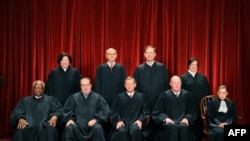The U.S. Supreme Court will hear oral arguments Monday, as it opens a new session that is expected to include major rulings on same-sex marriage, affirmative action and voting rights.
The justices are beginning with a case that examines whether companies can be sued in U.S. courts over human rights violations committed in other countries.
The case involves 12 Nigerians who sued Royal Dutch Petroleum, accusing the company of complicity in torture, executions and other violations committed in Nigeria under former military ruler Sani Abacha.
It has drawn international attention. The governments of Germany, Britain and Argentina, along with U.N. Human Rights chief Navi Pillay, energy companies and victims' rights groups have all filed so-called "friends of the court" briefs.
Next week the justices will hear arguments in a case challenging the use of racial preference in college admissions.
That case involves the University of Texas, where a white student says she was denied a spot based on admission policies that allow for race to be taken into account. Such affirmative action policies have been used by schools to select a more diverse student body, but opponents say the measures are unfair and no longer necessary to combat discrimination.
The Supreme Court last ruled on the issue in 2003, when it upheld the consideration of race as a factor in college admissions.
The court is also expected to take up cases involving the 1965 Voting Rights Act, which forces states with a history of racial and ethnic discrimination to get approval for changes to their voting laws.
In a 2009 decision, the justices showed skepticism about whether the provisions were still necessary. States seeking to lift the approval requirement are trying to enact reforms including new voter identification laws.
The other big issue expected to come before the court is same-sex marriage, specifically challenges to the Defense of Marriage Act, which bars same-sex couples from receiving a range of federal benefits.
Justice Ruth Bader Ginsburg says the court will likely take up same-sex marriage toward the end of the term.
The justices are beginning with a case that examines whether companies can be sued in U.S. courts over human rights violations committed in other countries.
The case involves 12 Nigerians who sued Royal Dutch Petroleum, accusing the company of complicity in torture, executions and other violations committed in Nigeria under former military ruler Sani Abacha.
It has drawn international attention. The governments of Germany, Britain and Argentina, along with U.N. Human Rights chief Navi Pillay, energy companies and victims' rights groups have all filed so-called "friends of the court" briefs.
Next week the justices will hear arguments in a case challenging the use of racial preference in college admissions.
That case involves the University of Texas, where a white student says she was denied a spot based on admission policies that allow for race to be taken into account. Such affirmative action policies have been used by schools to select a more diverse student body, but opponents say the measures are unfair and no longer necessary to combat discrimination.
The Supreme Court last ruled on the issue in 2003, when it upheld the consideration of race as a factor in college admissions.
The court is also expected to take up cases involving the 1965 Voting Rights Act, which forces states with a history of racial and ethnic discrimination to get approval for changes to their voting laws.
In a 2009 decision, the justices showed skepticism about whether the provisions were still necessary. States seeking to lift the approval requirement are trying to enact reforms including new voter identification laws.
The other big issue expected to come before the court is same-sex marriage, specifically challenges to the Defense of Marriage Act, which bars same-sex couples from receiving a range of federal benefits.
Justice Ruth Bader Ginsburg says the court will likely take up same-sex marriage toward the end of the term.




